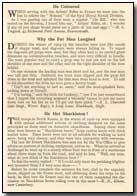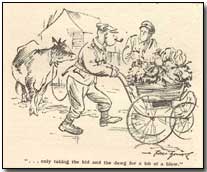Memoirs & Diaries - The Best 500 Cockney War Stories - He Met Shackleton! and Other Stories
 Published in London
in 1921, The Best 500 Cockney War Stories
comprised, in the words of its newspaper publisher (The London Evening
News) "a remembering and retelling of those war days when laughter
sometimes saved men's reason".
Published in London
in 1921, The Best 500 Cockney War Stories
comprised, in the words of its newspaper publisher (The London Evening
News) "a remembering and retelling of those war days when laughter
sometimes saved men's reason".
The collection of short memoirs, some 500 in total, is divided into five categories - Action, Lull, Hospital, High Seas and Here and There. This page contains five stories from Lull, led by He Met Shackleton!.
Other sections within the collection can be accessed using the sidebar to the right.
He Met Shackleton!
The troops in North Russia, in the winter of 1918-19, were equipped with certain additional articles of clothing designed on the same principles as those used on Antarctic expeditions.
Among these were what were known as "Shackleton boots," large canvas boots with thick leather soles.
These boots were not at all suitable for walking on hard snow, being very clumsy, and they were very unpopular with everyone.
The late Sir Ernest Shackleton was sent out by the War Office to give advice on matters of clothing, equipment, and so on.
When he arrived at Archangel he went up to a sentry whose beat was in front of a warehouse about three steps up from the road, and said to him, "Well, my man, what do you think of the Shackleton boot?"
To this the sentry replied: "If I could only meet the perishing blighter wot invented them I'd very soon show—"
Before he could complete the sentence his feet, clad in the ungainly boots, slipped on the frozen snow, and slithering down the steps on his back, he shot into Sir Ernest and the two of them completed the discussion on Shackleton boots rolling over in the snow!
K. D., Elham, near Canterbury
Domestic Scene: Scene, Bethune
Near the front line at Bethune in 1917 was a farm which had been evacuated by the tenants, but there were still some cattle and other things on it. We were, of course, forbidden to touch them.
One day we missed one of our fellows, a Cockney, for about two hours, and guessed he was on the "scrounge" somewhere or other.
Eventually he was seen coming down the road pushing an old-fashioned pram loaded with cabbages, and round his waist there was a length of rope, to the other end of which was tied an old cow.
You can imagine what a comical sight it was, but the climax came when he was challenged by the corporal, "Where the devil have you been?"
"Me?" he replied innocently. "I only bin takin' the kid and the dawg for a bit of a blow."
A. Rush (late 4th Batt. R. Fits.), 27 Milton Road, Wimbledon
Getting Their Bearings
It was on the Loos front. One night a party of us were told off for reconnoitring. On turning back about six of us, with our young officer, missed our way and, after creeping about for some 15 minutes, a message came down, "Keep very quiet, we are nearly in the German lines."
I passed on the message to the chap behind me, who answered in anything but a whisper, "Thank 'eaven we know where we are at last."
H. Hutton (late 16th Lancers, attached Engineers), Marlborough Road, Upper Holloway
High Tea
During the winter of 1917-18 I was serving with my battery of Field Artillery in Italy. We had posted to us a draft of drivers just out from home, and one of them, seeing an observation balloon for the first time, asked an old driver what it was.
"Oh, that," replied the old hand, who hailed from Hackney - "that is the Air Force canteen!"
M. H. Cooke (late "B" Battery, 72nd Brigade, R.F.A.), Regency Street, Westminster
Lots in a Name
Salonika, mid-autumn, and torrents of rain. The battalion, changing over to another front, had trekked all through the night.
An hour before dawn a halt was called to bivouac on the reverse slope of a hill until the journey could be completed in the darkness of the following night.
Orderlies from each platoon were collecting blankets from their company pack mules. Last of them all was a diminutive Cockney, who staggered off in the darkness with his load perched on his head. Slowly and laboriously, slipping backwards at almost every step, he stumbled and slithered up hill in the ankle-deep mud.
Presently he paused for breath, and took advantage of the opportunity to relieve his feelings in these well-chosen words: "All I can say is, the bloke as christened this 'ere perishin' place Greece was about blinking well right."
P. H. T. (26th Division)
Next - Gunga Din the Second and four other stories
A "biff" was a Bristol fighter plane.
- Did you know?

